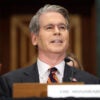On Monday, the White House announced that it will start issuing waivers for states to avoid the onerous provisions of No Child Left Behind (NCLB). The White House is making states sign on to Obama education policies in order to receive a waiver, completely bypassing Congress and the normal legislative process.
As Joy Pullman noted in the Weekly Standard this past Tuesday:
The president has decided to take a tack on the largest federal education law…bypassing Congress and legislating through administrative agencies by offering states waivers in exchange for education policies he favors.
Russ Whitehurst, Senior Fellow at the Brookings Institution, reported that never before has the United States seen “such a wholesale executive branch rewrite of federal law through use of the waiver authority”:
It is one thing for an administration to grant waivers to states.… It is quite another thing to grant state waivers conditional on compliance with a particular reform agenda that is dramatically different from existing law. The NCLB waiver authority does not grant the secretary of education the right to impose any conditions he considers appropriate on states seeking waivers.
Secretary Arne Duncan defended his actions in the Huffington Post:
To just sit here passively in Washington and do nothing, to me, would be the height of arrogance.
Rather, it seems, the arrogance lies in assuming that the White House can skirt the legislative process and lure states into accepting the President’s proposals.
Beyond this, President Obama and Secretary Duncan are undercutting states’ authority by requiring states to adopt national education standards in order to receive a waiver. Setting forth national standards is nothing less than a federal one-size-fits-all plan to dictate what children are taught in the classroom.
Yet Secretary Duncan, in promotion of the waiver plan, admonished NCLB for pushing “districts into one-size-fits-all solutions that just don’t work.”
Federal education reform must provide states greater flexibility and freedom from Washington’s heavy hand. NCLB inflicts 600-plus pages of federal programming on schools, hamstringing their ability to best meet students’ needs. The Obama Administration’s attempt to further centralize education policy only adds to the problem.
Pullman writes:
States will have to hire armies of administrators at enormous cost to make proposals they hope will please the president, then continue funding this bureaucracy to prove they are fulfilling their programmatic promises.
As Brooking’s Whitehurst nicely summed up:
If you’re a fan of greater presidential control of education (and domestic policy in general), it’s celebration time. If you like the separation of powers or thought that the reauthorization of NCLB might be an opportunity to put more control of schooling in the hands of parents at the expense of district, state, and federal bureaucracies, this is not your party.
































29 Replies to “Obama Administration Continues to Make Policy Through Waivers”